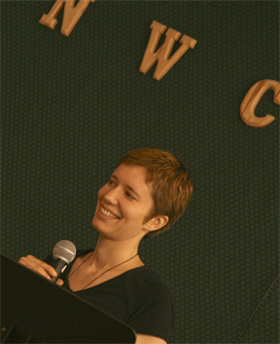by Lora Steiner, managing editor

About 50 Sunday school teachers from Franconia and Eastern District conference churches gathered on August 12 in preparation for the new school year.
Teachers met with other teachers of the same age levels and were led through a sample lesson in the new Shine curriculum, which is co-published by Brethren Press and MennoMedia.
Among the group was one person teaching for the first time, and two people who had taught for over 50 years.
The resourcing event was organized by the Franconia and Eastern District Conferences School for Leadership Formation. Perkiomenville (Pa.) congregation hosted the event and arranged logistics. Feedback from the day was very positive, and Christian educators in both conferences are looking forward to meeting again.
Jessica Hedrick, director of children’s ministry at Souderton (Pa.) congregation, offered a prayer at the event. It is printed here with permission, for all children as they begin a new year.
God, you took the children on your knee and blessed them when everyone else pushed them aside; help us to be fully present with the children in our homes, our churches, and our communities.
As we walk with the children on this journey of faith we know that you will give us everything we need.
Help us to see them with your eyes, so that we are not blind to their strengths or oblivious to their gifts.
Help us to love them with your heart, so that they may trust you more deeply and know you more fully.
Help us to listen to them with your ears, so that we may understand the significance of their thoughts and the value of their voices.
We are weak and imperfect, and we realize sometimes we may feel like we have failed.
Help us remember that you are a God who brings glory from the mess.
Help us to embrace the mess of our ministry.
When we do not have the answers, may the children be inspired by our faith.
When we make mistakes, may they see God’s grace at work in our lives.
When we feel too lost to lead, may they see our trust in your leading.
As we go into the rest or our evening, and then return home to our ministries, fill us with your Holy Spirit and renew our passion for your kingdom.
Surround us with your peace, love, and light so that we may shine brightly igniting the fire of your love in the hearts of the children.
May they see you in us and may we see you in them.







 I was reminded of this richness of the Anabaptist tapestry a few weeks ago when I went to visit Nations Worship Center in south Philadelphia. Nations Worship is an Indonesian-speaking congregation that recently joined Franconia Conference. I had been sent there to write about them in preparation for this move toward membership. At first glance, it seemed as though we had little in common: different ethnicities, different languages and different cultures. The church has a praise band and sings choruses in Bahasa Indonesia. Hands clapped and bodies swayed with the music. Scripture was read aloud together (as is the practice each Sunday). Members are invited to give testimony about God’s movement in their lives. The sermon reflected the realities of being a foreign people in a new land. A meal was served after the service; rice and tofu and a beef soup.
I was reminded of this richness of the Anabaptist tapestry a few weeks ago when I went to visit Nations Worship Center in south Philadelphia. Nations Worship is an Indonesian-speaking congregation that recently joined Franconia Conference. I had been sent there to write about them in preparation for this move toward membership. At first glance, it seemed as though we had little in common: different ethnicities, different languages and different cultures. The church has a praise band and sings choruses in Bahasa Indonesia. Hands clapped and bodies swayed with the music. Scripture was read aloud together (as is the practice each Sunday). Members are invited to give testimony about God’s movement in their lives. The sermon reflected the realities of being a foreign people in a new land. A meal was served after the service; rice and tofu and a beef soup.